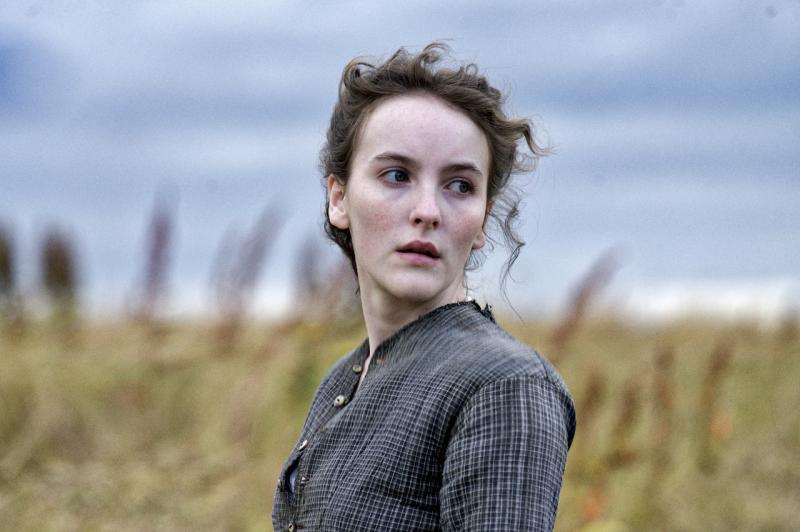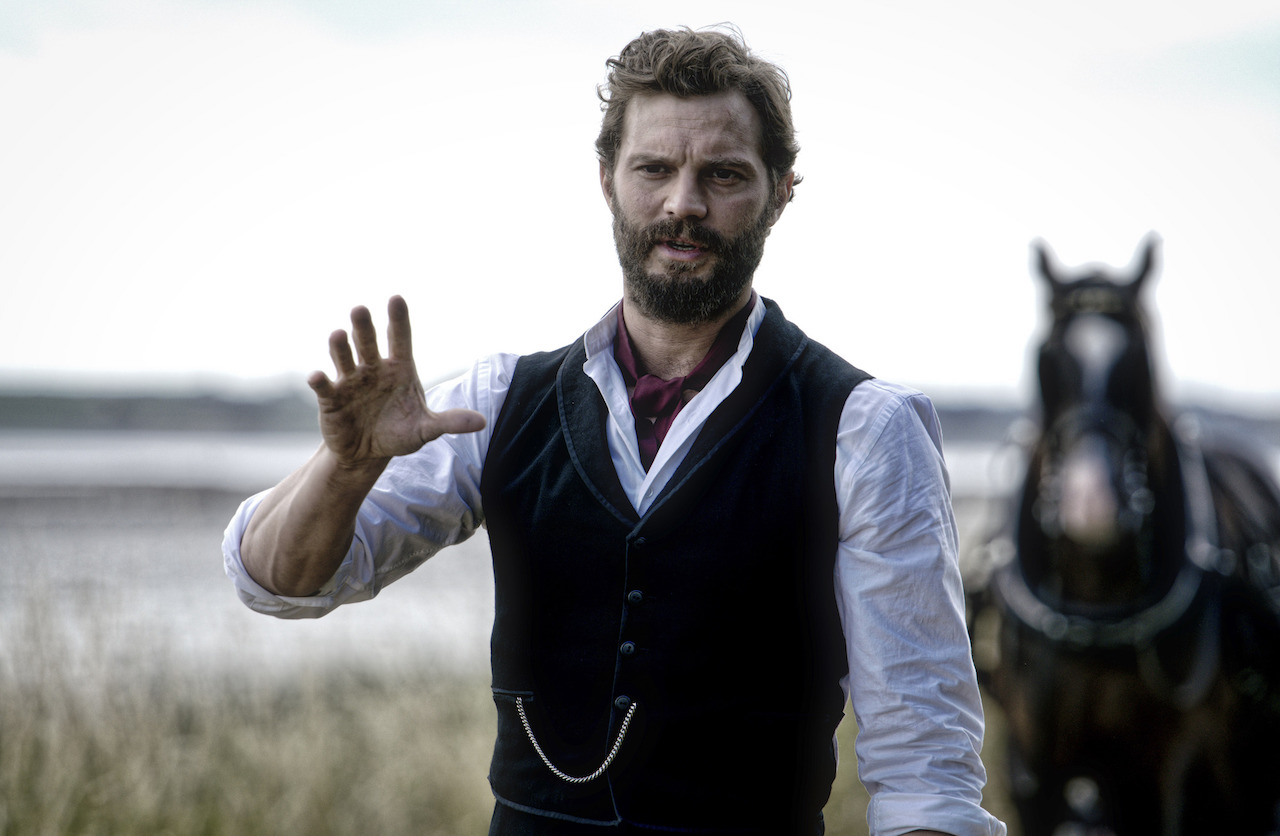Death and Nightingales, BBC Two, review - slow, lyrical, slightly dull | reviews, news & interviews
Death and Nightingales, BBC Two, review - slow, lyrical, slightly dull
Death and Nightingales, BBC Two, review - slow, lyrical, slightly dull
Jamie Dornan reunites with The Fall creator to explore passion and bigotry in 19th-century Fermanagh

And now for something completely different from The Fall. The nerve-shredding drama from Northern Ireland was written by Allan Cubitt and featured, as its resident psychopathic hottie, Jamie Dornan (pictured below).
The year is 1883, when on the occasion of her 23rd birthday young Beth Winters (Ann Skelly) plans to flee the homestead of her brute Protestant stepfather Billy (Matthew Rhys, twisting his vowels impressively) and take up with the smouldering Catholic neighbour (Dornan, see above). The atmosphere of intolerance and superstition firmly places all this at a safe distance from the here and now. So does the language, copied from the novel and pasted into the dialogue. “French gold put the shine on this place a hundred years ago,” says Billy. Beth says Billy has “kissed me not fatherly” (she says this twice).
 But is it not also just a little bit 2018? The Good Friday Agreement has changed the nature of drama in Northern Ireland. Stories about treachery and sectarian violence have long since made way for more cheerful fare such as the adorable schoolgirl sitcom Derry Girls and The Journey, in which Ian Paisley and Martin McGuinness made friends in the back of a car. But things are hotting up again in Ulster what with all this talk of backstops, the government’s supply-and-deal with the anti-abortionists of the DUP and the suspension of the Northern Ireland Assembly. Schism and dysfunction is once more on the agenda.
But is it not also just a little bit 2018? The Good Friday Agreement has changed the nature of drama in Northern Ireland. Stories about treachery and sectarian violence have long since made way for more cheerful fare such as the adorable schoolgirl sitcom Derry Girls and The Journey, in which Ian Paisley and Martin McGuinness made friends in the back of a car. But things are hotting up again in Ulster what with all this talk of backstops, the government’s supply-and-deal with the anti-abortionists of the DUP and the suspension of the Northern Ireland Assembly. Schism and dysfunction is once more on the agenda.
Meanwhile, back in 1883, the binary slipperiness of things in a place caught between cultures is captured in names. The priest will allow himself to be addressed “my lord”, but also Seamus or Jimmy. “I answer to Liz at school,” says Beth. “To Beth or Betty at the house.” These repetitions and echoes have the quality of poetic refrains, aptly perhaps for a story whose title alludes to Keats. They are not quite so hypnotic in the context of a drama, where you sometimes feel that you are just being told the same thing twice. There are other signs that the source material did not give up its charms willingly. There have been no fewer than three eavesdropping scenes so far, and not one but two incidences of stricken cattle.
It’s refreshing for a period drama to steer viewers towards unvisited stories. Death and Nightingales, which is also directed by Cubitt, looks beautiful enough, and Ann Skelly holds the centre with commendable stillness, while Rhys and Dornan embody different forms of masculinity. But for all the trappings of melodrama - stashed coin, poison, secret love trysts and one post-coital dip - it’s a bit bewitched by its own lyrical rhythms. Slow. Even ever so moderately dull?
rating
Explore topics
Share this article
Add comment
The future of Arts Journalism
You can stop theartsdesk.com closing!
We urgently need financing to survive. Our fundraising drive has thus far raised £49,000 but we need to reach £100,000 or we will be forced to close. Please contribute here: https://gofund.me/c3f6033d
And if you can forward this information to anyone who might assist, we’d be grateful.

Subscribe to theartsdesk.com
Thank you for continuing to read our work on theartsdesk.com. For unlimited access to every article in its entirety, including our archive of more than 15,000 pieces, we're asking for £5 per month or £40 per year. We feel it's a very good deal, and hope you do too.
To take a subscription now simply click here.
And if you're looking for that extra gift for a friend or family member, why not treat them to a theartsdesk.com gift subscription?
more TV
 Murder Before Evensong, Acorn TV review - death comes to the picturesque village of Champton
The Rev Richard Coles's sleuthing cleric hits the screen
Murder Before Evensong, Acorn TV review - death comes to the picturesque village of Champton
The Rev Richard Coles's sleuthing cleric hits the screen
 Black Rabbit, Netflix review - grime and punishment in New York City
Jude Law and Jason Bateman tread the thin line between love and hate
Black Rabbit, Netflix review - grime and punishment in New York City
Jude Law and Jason Bateman tread the thin line between love and hate
 The Hack, ITV review - plodding anatomy of twin UK scandals
Jack Thorne's skill can't disguise the bagginess of his double-headed material
The Hack, ITV review - plodding anatomy of twin UK scandals
Jack Thorne's skill can't disguise the bagginess of his double-headed material
 Slow Horses, Series 5, Apple TV+ review - terror, trauma and impeccable comic timing
Jackson Lamb's band of MI5 misfits continues to fascinate and amuse
Slow Horses, Series 5, Apple TV+ review - terror, trauma and impeccable comic timing
Jackson Lamb's band of MI5 misfits continues to fascinate and amuse
 Coldwater, ITV1 review - horror and black comedy in the Highlands
Superb cast lights up David Ireland's cunning thriller
Coldwater, ITV1 review - horror and black comedy in the Highlands
Superb cast lights up David Ireland's cunning thriller
 Blu-ray: The Sweeney - Series One
Influential and entertaining 1970s police drama, handsomely restored
Blu-ray: The Sweeney - Series One
Influential and entertaining 1970s police drama, handsomely restored
 I Fought the Law, ITVX review - how an 800-year-old law was challenged and changed
Sheridan Smith's raw performance dominates ITV's new docudrama about injustice
I Fought the Law, ITVX review - how an 800-year-old law was challenged and changed
Sheridan Smith's raw performance dominates ITV's new docudrama about injustice
 The Paper, Sky Max review - a spinoff of the US Office worth waiting 20 years for
Perfectly judged recycling of the original's key elements, with a star turn at its heart
The Paper, Sky Max review - a spinoff of the US Office worth waiting 20 years for
Perfectly judged recycling of the original's key elements, with a star turn at its heart
 The Guest, BBC One review - be careful what you wish for
A terrific Eve Myles stars in addictive Welsh mystery
The Guest, BBC One review - be careful what you wish for
A terrific Eve Myles stars in addictive Welsh mystery
 theartsdesk Q&A: Suranne Jones on 'Hostage', power pants and politics
The star and producer talks about taking on the role of Prime Minister, wearing high heels and living in the public eye
theartsdesk Q&A: Suranne Jones on 'Hostage', power pants and politics
The star and producer talks about taking on the role of Prime Minister, wearing high heels and living in the public eye
 King & Conqueror, BBC One review - not many kicks in 1066
Turgid medieval drama leaves viewers in the dark
King & Conqueror, BBC One review - not many kicks in 1066
Turgid medieval drama leaves viewers in the dark
 Hostage, Netflix review - entente not-too-cordiale
Suranne Jones and Julie Delpy cross swords in confused political drama
Hostage, Netflix review - entente not-too-cordiale
Suranne Jones and Julie Delpy cross swords in confused political drama

Comments
To describe this so called
I really enjoyed this. I